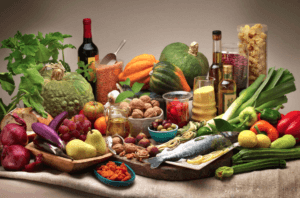
To ensure unhindered bilateral trade with the UK after its withdrawal from the European Union, the State Service of Ukraine on Food Safety and Consumer Protection has agreed on a number of forms of relevant certificates and is negotiating with the UK to deepen cooperation, the agency said in a press release. According to the document, at present, 20 forms of certificates for the export of products to the UK and 12 for the import of products from it have already been agreed.
“After the UK had left the European Union, our efforts were focused on agreeing the forms of certificates for bilateral trade on mutually beneficial terms. Today we already have 20 certificates for exports to the UK and 12 certificates for imports. Work in this direction continues,” head of the service Vladyslava Mahaletska said.
The service also noted that it is negotiating with the competent authorities of the UK on deepening bilateral cooperation, priorities for effective interaction between the parties, resolving veterinary and other issues.
As reported, Ukraine signed a FTA with the UK in 2020. The document provides for access to the British market for 98% of Ukrainian products, and from 2023 it will liberalize trade for another 2%. At the same time, the number of quota goods remains unchanged, although for a number of items their volumes have been expanded.

Ukraine in January-August 2020 increased import of crude oil (according to foreign trade activity code 2709) 1.9 times (by 419,371 tonnes) compared to the same period in 2019, to 901,526 tonnes.
According to the State Fiscal Service, in January-August, crude oil was imported for $293.75 million, which is 17.7% more than in the same period a year earlier ($249.578 million).
Some crude oil for $199.827 million came from Azerbaijan (the share is 68.03%), the United States for $48.338 million (16.46%) and Libya for $45.555 million (15.51%) and other countries for $0.03 million (0.01%).
In January-August 2019 and January-August 2020, Ukraine did not export oil.

The interagency commission for international trade at a meeting on Monday decided to stop the countervailing investigation into imports of new passenger cars originated from Uzbekistan to Ukraine, the Economic Development and Trade Ministry of Ukraine has said in a press release. “During the investigation, the Embassy of Uzbekistan in Ukraine presented official explanations: according to the presidential decree No. pp-800 dated August 21, 2008 on the creation of an enterprise with foreign investment (CJSC general Motors Uzbekistan) benefits were provided to Uzbek manufacturers, which starting from 2018, are no longer valid,” the Economic Development and Trade Ministry said.
The Ministry of Foreign Trade of Uzbekistan also informed the commission that the main share of exports of Uzbek cars in Ukraine is accounted for small class A cars, which are not produced in Ukraine, the ministry said.
“Thus, the interagency commission for international trade found that the use of compensatory measures is not necessary, and also decided to stop the countervailing investigation regarding the import to Ukraine of passenger cars originating from Uzbekistan without the application of measures,” the Economic Development and Trade Ministry reported.

The devaluation of the Turkish lira in the near future will not lead to sharp price fluctuations in export and import transactions between Ukraine and Turkey, but there are fears of a decrease in the revenues of Ukrainian exporters that supply goods to the Turkish market, the Ukrsadprom association has reported. “The main export goods for each country are largely tied to a stable foreign currency and depend more on the situation on the global market rather than on changes in the domestic market. Therefore, in the short term, at least until the end of this year, it’s not worth expecting sharp price fluctuations in export and import operations with Turkey,” the association’s press service told Interfax-Ukraine.
At the same time, according to Ukrsadprom experts, there are some concerns about the possible transition of Turkey in payments on foreign economic transactions with its main partners, including Ukraine, from the U.S. dollar to the national currency.
“We are currently considering the possibility of Turkey’s transition to settlements in foreign economic transactions with its main partners … This could cause inconvenience both in the settlement mechanism itself, and in setting prices and the appropriate exchange rate, because, according to most expectations, the Turkish lira will continue depreciating. As a consequence, there is a possibility of lower revenues for Ukrainian exporters,” Ukrsadprom indicates. However, in addition, there are grounds for a certain reduction in import prices for Ukraine when making purchases in Turkey, the association noted.
Ukrsadprom said Turkey is one of the largest importers of domestic agro-food products. For the first six months of this year, Ukraine exported agricultural products to Turkey for $458 million.

The introduction of an exit capital tax, envisaged by the draft law on amendments to the Tax Code of Ukraine regarding the tax on exit capital (No. 8557), will draw the attention of tax authorities to companies carrying out foreign economic operations, expert for transfer pricing at Evris law firm Yekateryna Kuzmina has told Interfax-Ukraine. “Companies that carry out foreign economic operations will be under a special attention of tax authorities in case this tax is introduced. In view of the fact that the exit capital tax is focused on foreign economic transactions, the controlling authorities will pay closer attention to compliance with transfer pricing rules, since this will be one of the main instruments to ensure new tax payment,” she said.
The expert noted that since the exit capital tax will have to be paid for each specific operation, the controlling bodies will no longer need to conduct long-term tax inspections as to the correctness of determining the financial result, in theory it will be enough for them to analyze bank statements and contracts.
“Thus, it is likely that the controlling bodies will concentrate their entire attention on initiating and conducting inspections,” Kuzmina believes.
She noted a number of changes in transfer pricing that will occur after the alleged adoption of the exit capital tax, in particular, small businesses will be required to prepare reporting on transfer pricing, the accumulated losses or other costs will not be able to compensate for the need to pay the exit capital tax to the budget, in addition, control over compliance with transfer pricing rules will be tightened.
Kuzmina noted that the practice of the exit capital tax is unpopular in the world – such taxes exist only in Estonia (since 2000), Georgia (since 2017), and Latvia (since 2018). It is assumed that the introduction of this tax will stimulate Ukrainian companies to invest in the development, building up business or production.
“This is due to the fact that if companies reinvest the earned funds in the development and do not withdraw resources from the enterprise by paying dividends, irrevocable financial assistance, free transfer of goods, labor and services, royalties, interest and other operations that lead to withdrawal of capital from the company, there will be no object for exit capital tax and the companies will not pay the tax. Thus, the importance of transfer pricing rules that regulate foreign economic operations rises significantly,” the expert summed up.